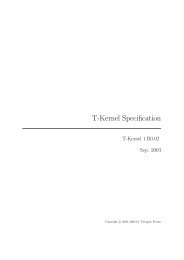[8] 2002 e-business-strategies-for-virtual-organizations
[8] 2002 e-business-strategies-for-virtual-organizations
[8] 2002 e-business-strategies-for-virtual-organizations
You also want an ePaper? Increase the reach of your titles
YUMPU automatically turns print PDFs into web optimized ePapers that Google loves.
Developing knowledge-based <strong>strategies</strong> <strong>for</strong> a <strong>virtual</strong> organization<br />
that can provide multiple, diverse and contradictory interpretations.<br />
This has been described as ‘the sense-making view’<br />
and is one that promotes continual challenge to the current way<br />
of doing things within a company and also <strong>for</strong>ms a basis <strong>for</strong> a<br />
continual challenge against procedures that would otherwise<br />
become a different set – congealing and outliving their usefulness,<br />
perhaps.<br />
Skyrme and Amidon (1997) specifically identify three new<br />
aspects <strong>for</strong> the knowledge agenda:<br />
1 Making knowledge and knowledge processes more explicit.<br />
2 The development of strategic frameworks to guide the<br />
exploitation of knowledge – in products, services and<br />
processes.<br />
3 The introduction of more systematic methods to the management<br />
of knowledge.<br />
These are the issues we will be addressing in the remainder of<br />
this chapter.<br />
7.4 Knowledge as an asset<br />
We would all agree that knowledge is an asset – whether it is<br />
knowing how long you can leave your car outside a building<br />
be<strong>for</strong>e getting a ticket, or knowing enough to get an Open<br />
University degree that will give you a better job. But knowledge<br />
is an asset in a different way from the way in which having cash<br />
in the bank, good health, or a rich father is an asset. We may<br />
usefully consider it as having four distinguishing<br />
characteristics:<br />
1 Extraordinary leverage and increasing returns – unlike most<br />
assets, knowledge is not subject to diminishing returns but<br />
grows in value.<br />
2 Fragmentation, leakage and the need <strong>for</strong> refreshment – as a<br />
collected body of knowledge grows it tends to branch and<br />
fragment. The pieces may lose touch with each other. This<br />
means that sometimes a lot of ef<strong>for</strong>t is put into creating an<br />
area of knowledge that is already known but by people in<br />
other places whom we didn’t think to ask. For this reason we<br />
need to keep refreshing our communication channels and<br />
knowledge reserves.<br />
3 Uncertain value – the results of knowledge gathering or<br />
sharing can be extremely difficult to estimate or measure and<br />
may not come up to expectations or equally may exceed<br />
them.<br />
147


![[8] 2002 e-business-strategies-for-virtual-organizations](https://img.yumpu.com/8167654/166/500x640/8-2002-e-business-strategies-for-virtual-organizations.jpg)












